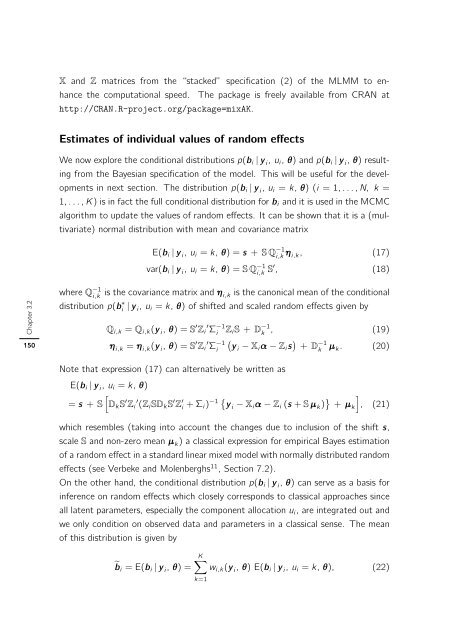View PDF Version - RePub - Erasmus Universiteit Rotterdam
View PDF Version - RePub - Erasmus Universiteit Rotterdam
View PDF Version - RePub - Erasmus Universiteit Rotterdam
Create successful ePaper yourself
Turn your PDF publications into a flip-book with our unique Google optimized e-Paper software.
Chapter 3.2<br />
150<br />
X and Z matrices from the “stacked” specification (2) of the MLMM to en-<br />
hance the computational speed. The package is freely available from CRAN at<br />
http://CRAN.R-project.org/package=mixAK.<br />
Estimates of individual values of random effects<br />
We now explore the conditional distributions p(bi | y i,ui, θ) and p(bi | y i, θ) resulting<br />
from the Bayesian specification of the model. This will be useful for the developments<br />
in next section. The distribution p(bi | y i,ui = k, θ) (i =1,...,N, k =<br />
1,...,K) is in fact the full conditional distribution for bi and it is used in the MCMC<br />
algorithm to update the values of random effects. It can be shown that it is a (multivariate)<br />
normal distribution with mean and covariance matrix<br />
E(bi | y i,ui = k, θ) =s + SQ −1<br />
i,k η i,k, (17)<br />
var(bi | y i,ui = k, θ) =SQ −1<br />
i,k S′ , (18)<br />
where Q −1<br />
i,k is the covariance matrix and η i,k is the canonical mean of the conditional<br />
distribution p(b ∗ i | y i,ui = k, θ) of shifted and scaled random effects given by<br />
Qi,k = Qi,k(y i, θ) =S ′ Zi ′ Σ −1<br />
η i,k = η i,k(y i, θ) =S ′ Zi ′ Σ −1<br />
i<br />
Note that expression (17) can alternatively be written as<br />
i ZiS + D −1<br />
k , (19)<br />
�<br />
y i − Xiα − Zis � + D −1<br />
k μk. (20)<br />
E(bi | y i,ui = k, θ)<br />
�<br />
= s + S DkS ′ Zi ′ (ZiSDkS ′ Z ′ i +Σi) −1 � y i − Xiα − Zi (s + S μk) � �<br />
+ μk , (21)<br />
which resembles (taking into account the changes due to inclusion of the shift s,<br />
scale S and non-zero mean μ k) a classical expression for empirical Bayes estimation<br />
of a random effect in a standard linear mixed model with normally distributed random<br />
effects (see Verbeke and Molenberghs11 , Section 7.2).<br />
On the other hand, the conditional distribution p(bi | y i, θ) can serve as a basis for<br />
inference on random effects which closely corresponds to classical approaches since<br />
all latent parameters, especially the component allocation ui, are integrated out and<br />
we only condition on observed data and parameters in a classical sense. The mean<br />
of this distribution is given by<br />
�bi =E(bi | y i, θ) =<br />
K�<br />
wi,k(y i, θ) E(bi | y i,ui = k, θ), (22)<br />
k=1

















